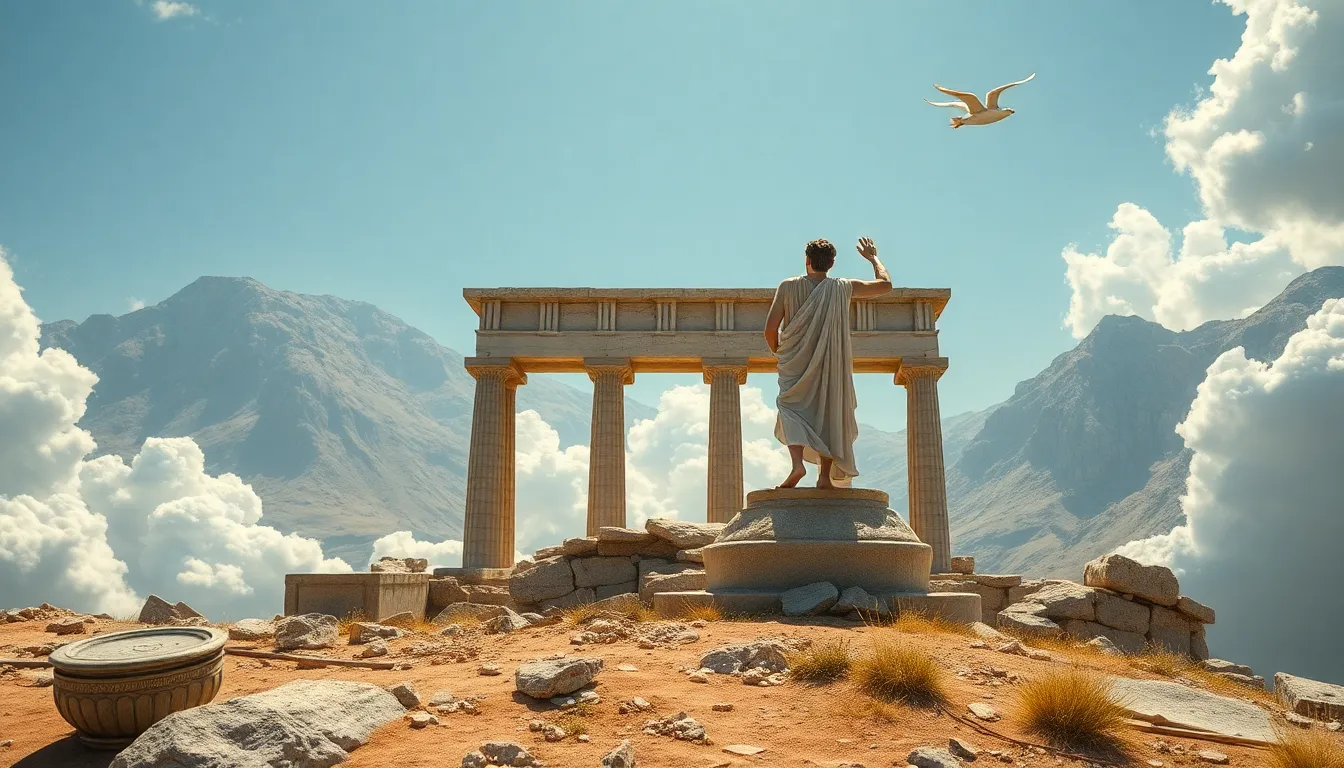The Myth of Daedalus and Icarus: A Story of Dreams and Disasters
I. Introduction
The myth of Daedalus and Icarus is one of the most enduring tales from Greek mythology, encapsulating themes of ambition, creativity, and the consequences of hubris. Daedalus, a master craftsman, and his son Icarus embark on a journey that ultimately leads to tragedy. This story has transcended its ancient origins, resonating through various forms of literature, art, and cultural narratives.
This article aims to explore the key themes of the myth, including the duality of dreams and disasters, while examining the characters of Daedalus and Icarus, the significance of their flight, and the lessons that can be drawn from their experience.
II. The Characters: Daedalus and Icarus
A. Daedalus: The Master Craftsman and Inventor
Daedalus is portrayed as a brilliant inventor and craftsman, renowned for his exceptional skills. His background is rich with tales of his creations, from the wooden cow that deceived King Minos to the intricate Labyrinth designed to contain the Minotaur.
His relationship with King Minos, however, becomes strained when Daedalus is imprisoned for assisting Theseus in escaping the Labyrinth. This imprisonment sets the stage for his greatest invention yet: the wings that would allow him and Icarus to escape their confines.
B. Icarus: The Ambitious Son
Icarus, the son of Daedalus, is characterized by his youthful ambition and desire for freedom. His character embodies the spirit of exploration, yet he is also a reflection of the inherent dangers that accompany such aspirations.
The dynamic between father and son is complex; Daedalus represents wisdom and caution, while Icarus embodies the impulsive quest for greatness. This tension plays a crucial role in the unfolding of their tragic story.
III. The Creation of the Wings
A. The Context of Their Imprisonment in the Labyrinth
Trapped in the Labyrinth, Daedalus and Icarus face seemingly insurmountable odds. The Labyrinth, a symbol of entrapment and confusion, represents the consequences of human folly and the limits of control.
B. Daedalus’s Ingenuity: Designing the Wings
To escape, Daedalus devises a plan to create wings made from feathers and wax. The process of creation involves meticulous attention to detail, showcasing his inventive spirit:
- He collects feathers from birds, ensuring they are of varying sizes for balance.
- Using wax, he meticulously binds the feathers together, crafting a pair of wings that are both functional and symbolic.
The wings represent freedom and innovation, symbolizing the human desire to transcend limitations and achieve greatness.
IV. The Flight: A Journey of Hope
A. The Escape from the Labyrinth
Once the wings are complete, Daedalus and Icarus take flight, escaping the confines of the Labyrinth. This moment marks a significant turning point in their narrative, filled with hope and exhilaration.
B. Initial Success and the Exhilaration of Flight
The experience of flight is exhilarating for both father and son:
- The sensation of soaring through the sky brings a profound sense of liberation.
- They witness the beauty of the world from a new perspective, symbolizing human potential and the triumph over adversity.
However, this moment of triumph is juxtaposed with the underlying tension of what is to come, highlighting the fragility of ambition.
V. The Fall: Lessons in Hubris
A. Icarus’s Disregard for His Father’s Warnings
As they fly, Daedalus cautions Icarus to maintain a moderate altitude, warning him of the dangers of flying too high or too low. However, Icarus, intoxicated by the thrill of flight, disregards his father’s advice:
- The temptation to soar higher proves irresistible.
- In his pursuit of greatness, Icarus overlooks the wisdom of moderation.
B. The Tragic End: Falling into the Sea
Ultimately, Icarus’s hubris leads to his downfall. As he flies too close to the sun, the heat melts the wax binding his wings, causing him to plummet into the sea.
This fall carries profound symbolic meaning, representing the consequences of unchecked ambition and the tragic fate that can arise from ignoring wisdom. It serves as a cautionary tale about the nature of ambition and its inherent dangers.
VI. Themes and Interpretations
A. The Duality of Dreams and Disasters
The myth of Daedalus and Icarus explores the duality of dreams and disasters, particularly the balance between ambition and caution. This theme resonates through various interpretations:
- Ambition can drive innovation and success, but it can also lead to reckless behavior.
- The role of parental guidance is crucial in navigating personal growth, emphasizing the importance of listening to wisdom.
B. Broader Cultural Interpretations and Adaptations
The story has inspired countless adaptations in art, literature, and modern media. From paintings to poetry, the themes of ambition and caution have universal relevance, allowing the myth to endure through the ages.
VII. Modern Parallels and Relevance
A. Lessons from the Myth in Contemporary Society
The lessons from the myth of Daedalus and Icarus remain pertinent in contemporary society:
- Striking a balance between ambition and practicality is essential in various fields, including technology and business.
- The dangers of overreaching aspirations can lead to significant consequences, echoing Icarus’s tragic fate.
B. Icarus as a Cautionary Figure in Today’s Context
Icarus serves as a cautionary figure, reminding us of the importance of humility and the wisdom of moderation. His story encourages individuals to pursue their dreams while remaining grounded and aware of their limitations.
VIII. Conclusion
In conclusion, the myth of Daedalus and Icarus is a rich narrative that explores the intricate balance between ambition, creativity, and caution. Through the characters of Daedalus and Icarus, we see the triumph of human innovation as well as the tragic consequences of hubris. This timeless tale continues to resonate in our contemporary world, serving as a reminder that while dreams can inspire us to soar to great heights, it is equally important to heed the wisdom of those who guide us.




